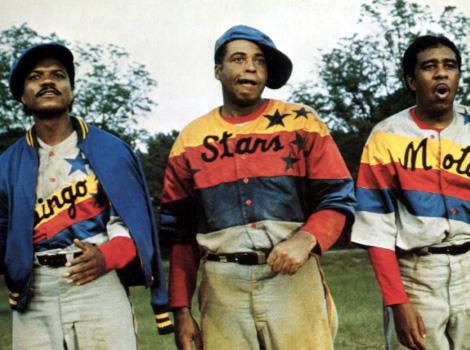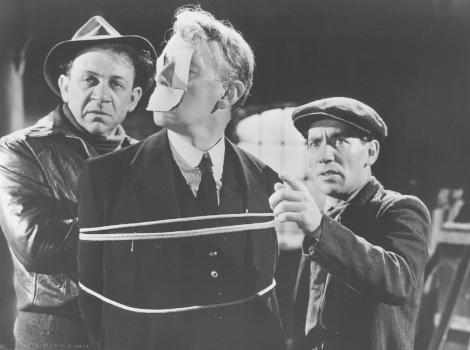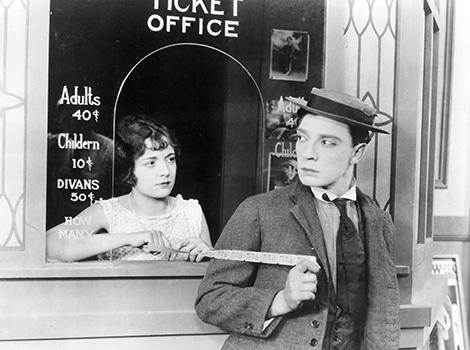The TCM Classic Film Festival, which turned 15 this year, annually presents primo pictures from yesteryear along with panels and talents linked to those movies at venues in Hollywood. TCM’s 2024 film fete included personal appearances by John Travolta, Steven Spielberg, Mel Brooks, Tim Robbins and even highlighted Jodie Foster “cementing” her place in Tinseltown history with a hand and footprint ceremony in the hallowed courtyard of what previously was Grauman’s Chinese Theater (now TCL Chinese Theatre Max, where Silence of the Lambs, Pulp Fiction, Close Encounters of the Third Kind, The Shawshank Redemption and Hitchcock’s North By Northwest were screened during the Festival). Enhancing the Festival’s heady ambiance is the great motion picture bonhomie among the film fans attending this movie-palooza, which also includes parties in Club TCM at the Hollywood Roosevelt Hotel.
Panel discussions are also held at Club TCM, and on April 20 I was on the horns of an existential dilemma. At 2:30 p.m., the “Reflections of the Thin Blue Line: The Police in Movies” panel was scheduled at Club TCM to analyze the portrayal of police onscreen. Panelists included actor/ director Mario Van Peebles, former NYPD officer/private investigator Herman Weisberg and Dr. Phillip Atiba Solomon, Professor of African American Studies and Psychology at Yale University, co-founder of the Center for Policing Equity. (See: https://filmfestival.tcm.com/schedule/reflections-of-the-thin-blue-line-the-police-in-movies/.)
However, almost at the same time, Donald Bogle, the world’s top authority on the African American screen image and author of 1973’s groundbreaking Toms, Coons, Mulattoes, Mammies & Bucks and many other books, was to present 1938’s The Mad Miss Manton, co-starring Henry Fonda, Barbara Stanwyck and Hattie McDaniel at the newly restored Egyptian Theatre. Bogle always imparts fascinating wisdom about how Black characters are represented onscreen, so which event should I attend?
What’s a film historian/critic to do?
Hearing the esteemed Bogle share his incisive insights into the celluloid stereotypes and misrepresentations of African Americans is always an annual highlight at the TCM Classic Film Festival, which bestowed its prestigious Robert Osborne Award last year on this author and scholar. So, like a movie Moses, I went way down to Egypt’s land – or at least to the Egyptian Theatre, my favorite cinema on Earth, which I hadn’t returned to since it reopened following a major refurbishing, and the mindboggling Bogle didn’t disappoint.
After being introduced by TCM host Jacqueline Stewart, Director/President of the Academy Museum of Motion Pictures, Bogle discussed The Mad Miss Manton, explaining that during “the 1930s screwball comedies were a staple genre of Hollywood films” that often featured “mismatched leads. They did away with conventional storylines and were surprising and always delighted.” Screwball comedies emerged during the Depression and often crossed class lines, depicting a world out of kilter as the capitalist system collapsed. The Mad Miss Manton has one of the best cute meets since Harry met Sally: When the bourgeois Melsa Manton (Barbara Stanwyck) first encounters the proletarian Peter Ames (Henry Fonda), Melsa slaps him across the face – and Peter slaps her right back! This being a screwball comedy, that can mean only one thing: [Plot Spoiler Alert:] Melsa and Peter will get hitched!
But Bogle’s primary focus of attention was Hattie McDaniel, who portrayed Melsa’s maid, Hilda. The preeminent film historian told the Egyptian’s packed (and mostly Caucasian) audience about the background of the first African American to win an Oscar, for playing Mammy in the 1939 blockbuster Gone with the Wind. McDaniel was “criticized for roles she did not write. Hattie rips those stereotypes apart. She was born to give orders, not to take them.”
Bogle went on to reveal something quite remarkable: “Hattie had zingers. The Breen Office [a motion picture industry self-censorship body that enforced the protocols of a rigid “Production Code”] objected to dialogue that made Hattie too familiar with whites she worked for. Some of the dialogue was cut.”
Early in The Mad Miss Manton while Melsa throws a party at her swanky Manhattan pad for her debutante gal pals (think Truman Capote’s “Swans,” only younger), when the doorbell rings. After a partygoer informs Hilda of this, she snaps: “I hear it. I ain’t deaf. Sometimes I wish I was.” If this is an example of a McDaniel quip that wasn’t deleted, one can only imagine what Breen’s censors forced to be left on the cutting room floor. Offscreen Hattie was famous for saying, “I may play a maid, but it’s better than being a maid.” Servant roles may have been the only ones available to her in racist, apartheid America – but it doesn’t mean that Hattie and her characters liked it.
BTW, the dialogue throughout The Mad Miss Manton is full of topical, lefty references, to “revolution,” “communism,” “class,” the Roosevelt administration’s “W.P.A.” New Deal jobs project, “class conscious,” and the like. I did some cinematic sleuthing and discovered that one of the three screenwriters credited for Manton was Philip G. Epstein, co-writer of the 1942 anti-fascist classic Casablanca and of Frank Capra’s Popular Front Why We Fight documentaries, including 1943’s Oscar-nommed The Battle of Russia. Epstein, who was part of the star-studded Committee for the First Amendment that opposed the Hollywood Blacklist in 1947, was presumably the main source for the left-leaning jargon – and Hattie’s acid-tongued rejoinders to her white “superiors” – in Manton’s jaunty dialogue. During Hollywood’s much-vaunted Golden Age, when non-stereotypical Black characters appeared onscreen, a leftist scribe and or director is usually found in the credits.
Speaking of class consciousness and African American roles, on April 21, the filmfest’s final day, I enjoyed 1976’s The Bingo Long Traveling All-Stars & Motor Kings at the Chinese Multiplex #1. I hadn’t seen this comedy drama about Negro League era baseball players since it was released, and the experience of seeing it again was heightened by a live appearance by the actor who played the title character. Billy Dee Williams was interviewed by a gushing Ben Mankiewicz before the screening, and the thesp known for his suave style and good looks revealed himself to be an idiosyncratic, introspective thinker.
In Bingo Long Williams co-stars with the awesome James Earl Jones and a hilarious Richard Pryor as athletes so tired of their exploitation by owners that they decide to “seize the means of production,” as they put it. The players form their own baseball team and the eponymous Traveling All-Stars and Motor Kings organize themselves along socialist lines. It is collectively owned by all of the teammates, including the batboy, with the slogan: “Equal pay for equal play.” Jones’ character quotes and reads a book by W.E.B. Du Bois (who, towards the end of his life, joined the Communist Party USA and relocated to newly independent Ghana). One of the really interesting things about Bingo Long is its class struggle component: The owners the players battle are Black, and economics is at the core of their oppression and fight for liberation, not race.
Another notable thing is that unlike most Hollywood movies about revolt that end badly for rebels, with their submission to authority, defeat and even death, Bingo Long’s rebellious athletes are champs, not chumps. In the movie, their collective triumph leads to breaking professional sports’ color barrier. This joyous film was directed by John Badham a year before he helmed Saturday Night Fever.
Long before he played Prince Faisal in 1962’s Lawrence of Arabia and Obi-Wan Kenobi in the Star Wars franchise, the London-born Alec Guinness – who wasn’t an Arab or space alien – starred in the veddy British Ealing Studios comedies, including 1951’s droll The Lavender Hill Mob.
I ended my cinematic sojourn by returning to the Egyptian for a hysterically funny Buster Keaton double bill, featuring 1921’s The Goat and the centennial presentation of Keaton’s comedic masterpiece, 1924’s Sherlock Jr. The endlessly inventive film pioneer’s sight gags, slapstick and innovative montages continue to delight and enrapture audiences100 years later. The Mont Alto Motion Picture Orchestra enhanced the experience, by accompanying Buster’s silent movies with live music.
I suppose Sherlock Jr. – wherein a projectionist dreams he’s an ace detective – closed out the TCM Classic Film Festival because Keaton’s comedy fit in with the fest’s central theme “Most Wanted: Crime and Justice in Film.” As I explained in the opening of Part I of my review of the filmfest, Spectrum/Charter has committed a cultural “crime” against me for spoiling transmission of Turner Classic Movies since September 2023. For repeatedly failing to repair these tech issues that have made it impossible for me to watch my favorite TV channel for eight months – although I’m charged for it monthly by the overpriced cable corporation – Spectrum/Charter must face “justice.” I’ve filed an FCC complaint against Spectrum/Charter (#6985583) and am seeking an attorney to sue them. Let’s hope I don’t have to wait until 2025’s Classic Film Festival before I can enjoy TCM again.
For more info: https://filmfestival.tcm.com/ .



